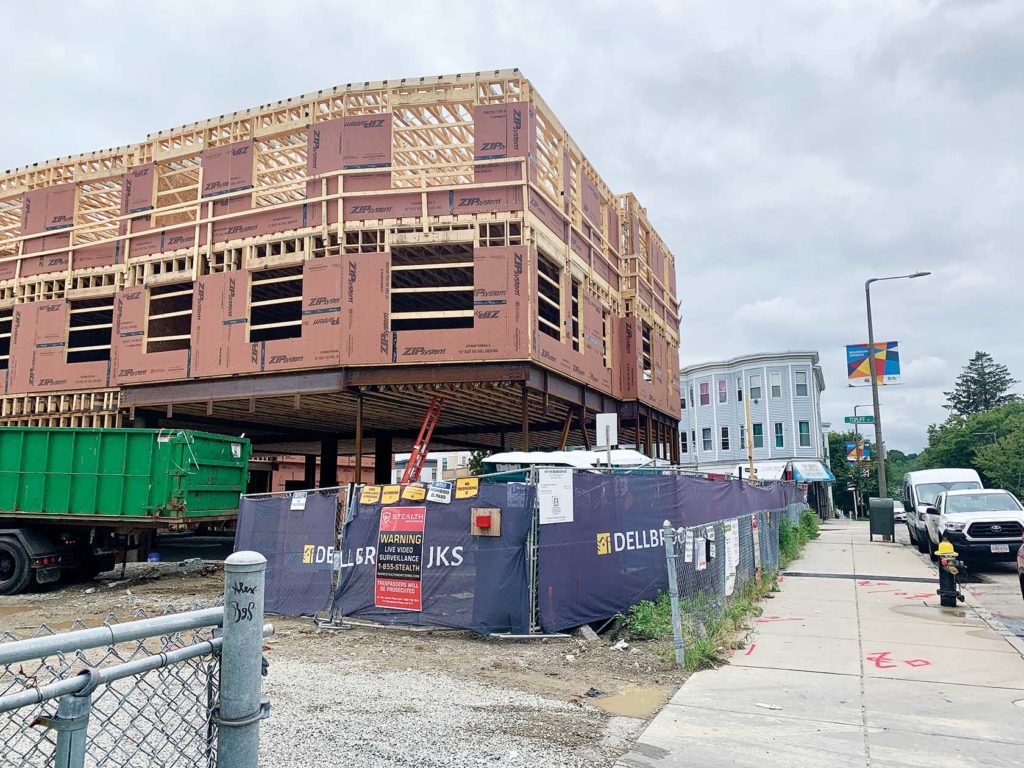BOSTON
UJIMA
PROJECT
FALL 2021
INVESTOR UPDATE
VOL. 1, ISSUE 3

I think Ujima has a great approach to sustainability; this isn’t just about democratic processes, but really about doing things together. Everyone has a piece of the pie. Everyone has a voice. And everyone has some part of the responsibility. — Joyce P. Clark-Henry, Investor
Boston, MA — December 10, 2021
The Boston Ujima Project is pleased to present our third and final Investor Update of 2021. The Ujima Fund has continued to see growth and success with its raise. We are excited to announce that we have reached our investment capital goal to raise $4.5MM to reinvest in working-class communities of color in Boston.
In Q3, we remained steadfast in our commitment to financing solutions to social and economic inequality, continuing our work to raise capital for the Ujima Fund, small business recovery funds and finance small and medium enterprises, as well as promote solidarity economy work. As we set our sights on the end of the year, we remain focused on deploying additional capital and continuing to grow our portfolio, particularly in the areas of small business, real estate, sustainability, and cultural access. We are excited for the progress we’ve made in 2021 to make the economy work for us, more often, and are grateful for your support.
The Boston Ujima Project is pleased to present our third and final Investor Update of 2021. The Ujima Fund has continued to see growth and success with its raise. We are excited to announce that we have reached our investment capital goal to raise $4.5MM to reinvest in working-class communities of color in Boston.
In Q3, we remained steadfast in our commitment to financing solutions to social and economic inequality, continuing our work to raise capital for the Ujima Fund, small business recovery funds and finance small and medium enterprises, as well as promote solidarity economy work. As we set our sights on the end of the year, we remain focused on deploying additional capital and continuing to grow our portfolio, particularly in the areas of small business, real estate, sustainability, and cultural access. We are excited for the progress we’ve made in 2021 to make the economy work for us, more often, and are grateful for your support.
In this latest report, you will find our newest resource, Ujima’s Investment Pipeline Status Page, which aims to create more transparency in our process by providing open-source access to our investment lists, ballots, business alliance, and investment process overall.
Moreover, you will find interviews with four esteemed investors of the Ujima Fund, who reflect on legacy and futurity, and a special essay, Speculative Notes on Land and Legacy by Cierra Peters and Paige Curtis, who are part of Boston Ujima Project’s Culture and Communications Team.
Lastly, you will find an updated Ujima Fund Financial Dashboard, as well as portfolio and business alliance updates. Scroll down to peruse the website and learn more.
Archived and current reports are available on our investor report homepage: www.necessary.systems/report ■
Moreover, you will find interviews with four esteemed investors of the Ujima Fund, who reflect on legacy and futurity, and a special essay, Speculative Notes on Land and Legacy by Cierra Peters and Paige Curtis, who are part of Boston Ujima Project’s Culture and Communications Team.
Lastly, you will find an updated Ujima Fund Financial Dashboard, as well as portfolio and business alliance updates. Scroll down to peruse the website and learn more.
Archived and current reports are available on our investor report homepage: www.necessary.systems/report ■
I think about the idea of cooperative economics, that to me is what this Fund allows us [to do]— to live that. There doesn’t seem to be space for us to do that in this country. The collective impact of racism and colonization, which is just another word in my mind for racism, has effectively stripped us in many ways of our capacity to trust each other. And to build a cooperative economic space. We now have to take time to capture that again. — Marie St. Fleur, Investor
PORTFOLIO HIGHLIGHTS
I don't want to invest in Wall Street because I don't want to have people laid off just for me to make a profit. I also really believe in community, and I like the businesses in Ujima’s Good Business Alliance that are out there with good business standards, and care about the community. I like it that you go to the community before you make decisions because you want to make sure the community supports your work.—Louise Baxter, Investor
BUSINESS ALLIANCE UPDATES

Fresh Food Generation
Eater.com, November 2021
“After more than half a decade of intense efforts, Boston catering and food truck business Fresh Food Generation opened the doors of its new Caribbean American restaurant on November 10 at 185 Talbot Ave. in Dorchester.”
Fresh Food Generation is not currently seeking investment from the Ujima Fund.

Dorchester Food Co-op
Baystate Banner, August 2021
“Community-owned grocery store will open next year with housing.”
Dorchester Food Co-op is currently seeking investment from the Ujima Fund. This week the Ujima Fund released the DFC credit memo to Ujima Voting Members for the last phase of due dilligence. A formal investment vote is planned to start in January 2022.
INVESTMENT PIPELINE
Visit our new Investment Pipeline Status page to track the progress of the Ujima Fund’s investment plans, lists and votes.
Speculative Notes on
Land and Legacy
Long before scientists “discovered” that ecosystems have a memory all their own, Indigenous peoples knew that land forgives, but does not forget. Over seasons of abundance, scarcity, renewal, extraction, and restoration, there is no greater site for resilience than the land. No strangers to this, Black and brown communities have always figured prominently in ecological memory: as stewards, cultivators, knowledge-keepers, and healers.
What might it look like to reclaim this relationship to the land?
To care for land and geographies as if our life depends on it - because it does. Recall that the land has known us all our lives, even when we lack hope or act beyond recognition. Tracy K. Smith said, “everything that ever was, still is, somewhere.” As movement-builders and students of the land, we build on the legacy left by our forebears and those who continue to inspire us. After all, what is sustainability, but a way to say “our future matters?”
Fact is simply fiction endorsed by state power. It begins with the stroke of a pen. Trees and forests become territory. Territory becomes property. Property becomes people. People become laborers. Laborers clear the landscape, begetting more property, more laborers. In order to make space people, their histories, and ways of being are erased.
Remembering that territory was once land becomes a crucial site for intervention.
Here is an open question, an impossible question, which can trace (lightly) our everyday considerations: how are we beholden to, or beholders of, each other in ways that change across time and place and space?
In her 1996 essay, The Site of Memory, Toni Morrison remarked, “You know, they straightened out the Mississippi River in places, to make room for horse and livable acreage. Occasionally the river floods these places. ‘Floods' is the word they use, but in fact it is not flooding; it is remembering. Remembering where it used to be. All water has a perfect memory and is forever trying to get back to where it was.” The flood is a method for redressing our alienation from land, labor and love. The flood is an everyday legal, historical, spiritual condition. The flood documents the places we cannot forget. The flood troubles what we know about ourselves.
What might it look like to reclaim this relationship to the land?
To care for land and geographies as if our life depends on it - because it does. Recall that the land has known us all our lives, even when we lack hope or act beyond recognition. Tracy K. Smith said, “everything that ever was, still is, somewhere.” As movement-builders and students of the land, we build on the legacy left by our forebears and those who continue to inspire us. After all, what is sustainability, but a way to say “our future matters?”
Fact is simply fiction endorsed by state power. It begins with the stroke of a pen. Trees and forests become territory. Territory becomes property. Property becomes people. People become laborers. Laborers clear the landscape, begetting more property, more laborers. In order to make space people, their histories, and ways of being are erased.
Remembering that territory was once land becomes a crucial site for intervention.
Here is an open question, an impossible question, which can trace (lightly) our everyday considerations: how are we beholden to, or beholders of, each other in ways that change across time and place and space?
In her 1996 essay, The Site of Memory, Toni Morrison remarked, “You know, they straightened out the Mississippi River in places, to make room for horse and livable acreage. Occasionally the river floods these places. ‘Floods' is the word they use, but in fact it is not flooding; it is remembering. Remembering where it used to be. All water has a perfect memory and is forever trying to get back to where it was.” The flood is a method for redressing our alienation from land, labor and love. The flood is an everyday legal, historical, spiritual condition. The flood documents the places we cannot forget. The flood troubles what we know about ourselves.
Here is an open question, an impossible question, which can trace (lightly) our everyday considerations: how will we see ourselves?
Do we live off the spoils of the captor? Do we reframe our economic relationships to the land? Do we move, ever so softly, towards demarcating the spaces where we can safely enact a radical politic? Do we orient away from steady-state economies towards planned and equitable shrinkage which might be more aligned with the Earth’s biophysical limitations? Do we continue at a rate of growth that relies on exploitation and accumulation? Do we accelerate into oblivion? What will our legacy be?
Memory is a process of call and response; it represents the moments we willingly recall, process and archive for future use. Rememory addresses the recollection of the stories that we have forgotten and repressed. Rememory encompasses both haunting and beauty. In the ocean, memory can be described as “residency time,” or amount of time nutrients exist in the water. The residence time of an ocean is 4,000 years. Like the Internet, it seems that we can last many forevers here. There is no nostalgia for oceanic waters. The memories of our ancestors still exist, the memories of our (many) wreckages still exist, and we are memorialized with every wave. The water is a witness.
Here is an open question, an impossible question, which can trace (lightly) our everyday considerations: what does it look like to feel held?
Rhizomes are horizontal plant systems, from which the shoots and roots of new plants can be produced. Because they grow horizontally and underground, rhizomes are able to sustain under extreme weather conditions. During hurricanes, rhizomatic trees can withstand the winds and rain because their roots are deeply networked. This is what the land teaches us about how to survive disaster. We do not need to burrow further into binary imaginations of breadth or depth; we can have both when our ecosystems are engineered to understand that we are stronger together. The conditions for these formations cause all notions of singularity to fall apart. It is a new orientation to living and being with all life forms. It offers an entrypoint into linkages between the experiences of terra (the land), mare (the sea), fauna (plant life), and all beings, and our oppressions.
Do we live off the spoils of the captor? Do we reframe our economic relationships to the land? Do we move, ever so softly, towards demarcating the spaces where we can safely enact a radical politic? Do we orient away from steady-state economies towards planned and equitable shrinkage which might be more aligned with the Earth’s biophysical limitations? Do we continue at a rate of growth that relies on exploitation and accumulation? Do we accelerate into oblivion? What will our legacy be?
Memory is a process of call and response; it represents the moments we willingly recall, process and archive for future use. Rememory addresses the recollection of the stories that we have forgotten and repressed. Rememory encompasses both haunting and beauty. In the ocean, memory can be described as “residency time,” or amount of time nutrients exist in the water. The residence time of an ocean is 4,000 years. Like the Internet, it seems that we can last many forevers here. There is no nostalgia for oceanic waters. The memories of our ancestors still exist, the memories of our (many) wreckages still exist, and we are memorialized with every wave. The water is a witness.
Here is an open question, an impossible question, which can trace (lightly) our everyday considerations: what does it look like to feel held?
Rhizomes are horizontal plant systems, from which the shoots and roots of new plants can be produced. Because they grow horizontally and underground, rhizomes are able to sustain under extreme weather conditions. During hurricanes, rhizomatic trees can withstand the winds and rain because their roots are deeply networked. This is what the land teaches us about how to survive disaster. We do not need to burrow further into binary imaginations of breadth or depth; we can have both when our ecosystems are engineered to understand that we are stronger together. The conditions for these formations cause all notions of singularity to fall apart. It is a new orientation to living and being with all life forms. It offers an entrypoint into linkages between the experiences of terra (the land), mare (the sea), fauna (plant life), and all beings, and our oppressions.
Financial Dashboard
For additional updates and more in depth information on the Ujima Fund, visit our Financial Dashboard.
DO YOU WANT TO INVEST IN UJIMA?
Ujima is proud to announce that we have met from our $4.5 million investment capital goal. In response to this milestone, we have temporarily disabled investments. Ujima members and supporters can still contribute to the Ujima Fund by donating to the Imani pool here.
IS YOUR INVESTMENT MATURING SOON?
The Ujima Fund sent personalized annual investor statements to each investor on October 29, 2021.
For investors whose maturity (pay back) date is within the next year, we invite you to consider completing a Maturity Extension Form to make a 3-year renewal of your investment and/or to donate some or all of your interest returns back to the Ujima Fund.
Kujichagulia Note Maturity Election Form
Umoja Note Maturity Election Form
Please contact us if you did not recieve your annual investor statement, please notify us at invest@ujimaboston.com.
Read all of our recent press here.
The Ujima Fund sent personalized annual investor statements to each investor on October 29, 2021.
For investors whose maturity (pay back) date is within the next year, we invite you to consider completing a Maturity Extension Form to make a 3-year renewal of your investment and/or to donate some or all of your interest returns back to the Ujima Fund.
Kujichagulia Note Maturity Election Form
Umoja Note Maturity Election Form
Please contact us if you did not recieve your annual investor statement, please notify us at invest@ujimaboston.com.
Read all of our recent press here.






